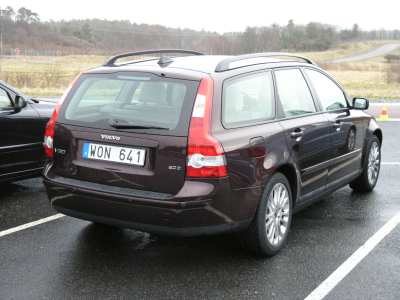
I was at the Volvo test track in Gothenburg last week and as hard as it is to imagine this little 2-litre diesel Volvo V50 sportswagon was the most impressive thing I drove. This is because I could never imagine enjoying it. This diesel engine feels exactly like a turbo charged gas engine. It goes 0-60 in about 9 seconds and is pulling well into higher speeds. In fact the car will do 130. And it handles better than my Corvette. I’m posting this since there seems to be a lot of confusion about this car on the various pro-diesel forums. A good review can be found here on the Supercarsite. The Volvo folks would not say whether or not they will ever bring this rod to the USA. And while the company has the absolute best factory delivery program, they won’t sell you a car not approved for North America since they will not be able to ship it to you.
If you buy a Volvo from the factory they fly you over free, put you in a hotel, deliver the car and let you drive it around Europe. You then drop it back off, they refurbish it and ship it to the USA while you fly back. And you save about $5000 or so on the car price. “Nobody believes this deal,” I was told. Somebody believes it since 40 Americans each and every day show up at the factory to pick up their cars.















You don’t believe it because we’re all diesel-ignorant Americans. I can’t believe the tester left out the fuel economy. I’m guessing it’s about 40 miles per gallon, or better. Volkswagen has been selling a 1.9 liter turbo diesel in the states since ’96.
Americans are stuck with this image in their head of the early 80’s GM diesels: noisy, slow and unreliable.
What they should be seeing instead is something like the diesel sedans currently available in Europe. BMW, Mercedes, Audi, VW all have them, and they’re all quicker to 60 mph than the exact same model in a gas version. Add anywhere from 30 to 50% better fuel economy, and you’ve got a winner.
WAKE UP TO THE SMELL OF DIESEL, AMERICA!
Ryan
Got, I hope you’re not considering buying one. We had a 2000 V40 (V50 predecessor). WORST LEMON I’VE EVER OWNED. After one month, the brake sensor went out, went downhill from there. Interiour trim constantly broke (cup holder six or seven times). The driver’s seat belt tore (self-shredding seat belts – Volvo “safety”!). Brake and engine sensors failed multiple times. Brakes needed replacing in less than 20K miles. Rear trunk handle cracked. Wiring defect repeatedly blew out the headlights. Hood paint faded badly after just two years. Winshield wiper switch failed. Front end bearings failed. And – the final blow! It burned all it’s oil dry. That’s when we finally got rid of the piece of sh*t.
Ryan, you are correct about early 80’s diesels from GM. I owned one and it was everything you say and more. The problem in the US is the cost of diesel fuel which is far higher than even premium gasoline in many areas. There are plenty of diesels in the US, and it now seems that the car dealers have their mechanics trained to repair them. But you still pay through the nose for a diesel engine, and the added cost of fuel is another deterrent right now! No one seems to know why?
gyro, diesel prices are always higher in the winter due to competition from home heating oil. The products are equivalent, with dye being added to HHO to prevent use on the road. (or rather, to make it easy for DOT to determine if you’ve used it in a diesel vehicle.) The upgrade price for the diesel engine in the ’05 Passat is: $255. TWO HUNDRED FIFTY-FIVE DOLLARS (‘merican) Even with the price of diesel slightly higher (check again in the middle of summer) the increased fuel economy will more than make up for the difference.
I think the upgrade price on my ’01 Jetta TDI was about $500. I’m currently getting around 50 mpg, and can go over 700 miles between stops for fuel.
All diesel vehicles also have the benefit of being compatible with a completely renewable, sustainable domestic fuel called biodiesel. Many stations are already selling diesel/biodiesel blends of 20% biodiesel or more. There are many domestic sources for this fuel, with more cropping up every day.
Of course, this being America, any subsidies that we may be able to remove from the soybean industry will have to be reapplied to Quicky-marts if everybody starts driving 700 miles between fillups. Since everyone will be stopping 1/2 to 1/3 as often, their sales of RC and Moon Pies will plummet!
Ryan